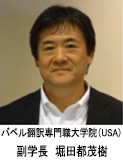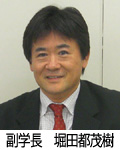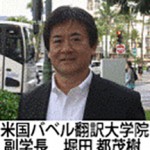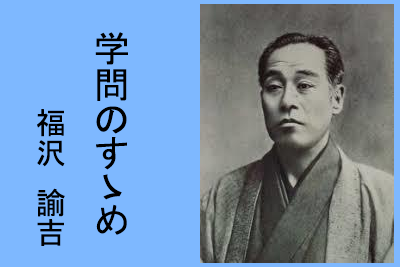
「学問のすすめ」
天は人の上に人を造らず、人の下に人をつくらず、と云えり。
人は生まれながら平等であると言われているが、
現実には大きな差がある。それはなぜであろうか。
その理由は、学んだか学ばなかったかによるものである。
学問を身につけ、自分の役割を果たし独立すべき。
自由とわがままは異なる。学問とはその分限を知ることである。
自分の行いを正し、学問を志し、知識を広め、各自の立場に応じて才能と人格を磨き、
外国と対等に付き合い、日本の独立と平和を守ることが急務である。
福澤諭吉の「学問のすすめ」は、明治維新の5年後、1872~76年に書かれています。人口が3500万人の当時、340万部も売れた驚異のベストセラー、今日で言えば、日本の人口が1億2千万人であるとすると、なんと1200万部ということになります。
当時の日本は明治維新を経て、言わば強制的に鎖国を解かれ、本格的なグローバル社会へ突入した、まさに激動期、社会、国家革命を目前にした時です。
この本は、まさに新しい時代を拓く指南書として多くの日本人が貪り読んだ本でした。
従って、「学問のすすめ」は単なる個人の能力至上主義を唱えたものではなく、個人の社会的あり方、役割を説いたもので、個人が自立するなかで国家自体の繁栄が成し遂げられる事を説いています。これが独立自尊。
今という時代の課題を考えると、当時、日本が直面していた難題と不思議と符合すると言われます。
・グローバル化の波が押し寄せ、右往左往する主体性を欠く日本
・近隣諸国が謂れなき侵略意図をほのめかし、
・国は長期の財政赤字で破綻寸前
・政府は企業優先、庶民を顧みない
・社会制度の崩壊、遅々として進まない構造改革
等々の状況を見ても、当時、福澤が指摘すると同様、今こそ、次の時代への明確な展望を持つべきときに来ていると思います。国に依存せずに、個々が自らできることを自覚するときにあると考えます。
そんな時代に福澤諭吉が唱えたのが 「実学のすすめ」 。
ここで私は、時代意識を転換する新しい視点として、優れて実践的な学であるべき翻訳、
日本の世界における新たな役割を示唆する「翻訳のすすめ」、いや『日本発信のすすめ』を今こそ皆さんとともに考えていきたいと考えます。
世界がボーダレス一つになる中、各々の言語を生かしつつ、情報の共有化を図り、世界を融和、相互発展させるには『 翻訳 』は欠かせない方法論と考えます。日本は‘翻訳立国’と言われて久しいにも係わらず、国家レベルの施策において翻訳の占める位置付けはあまりにも低いとしか言いようがありません。細やかなコミュニケーションスタイルをもつ日本人の特性を持ってすれば、多・双方向翻訳で『翻訳再立国』を果たし、東西、南北の橋渡しとなり、日本と世界との情報格差を無くし、その‘多・双方向翻訳力’を持って世界に貢献するという図式もあながち夢物語ではないと考えます。
そのために、バベルは翻訳大学院を2000年に設立しましたが、翻訳高等教育の在りかたにとどまらず、国家レベルの施策としての『 翻訳ナショナリズム の構築』をめざしたいと思います。
日本は明治維新以来、福沢諭吉をはじめ、西周、中江兆民をはじめ多くの啓蒙家が、西欧の文化、文物を‘和魂洋才’を念頭に急速に取り入れ、国家の近代化を果たしてきました。これは、換言すれば、‘翻訳’を通して当時の西欧の先進文化、文明を移入してきたと言えます。俗に、‘翻訳立国―日本’と言われる所以です。
六世紀から七世紀にかけて中国文化を移入したときには大和言葉と漢語を組み合わせて翻訳語を創り、明治維新以降は西欧の人文科学、社会科学等のそれまで日本にはなかった抽象概念を翻訳語として生み出してきました。societyが社会、 justiceが正義、truthが真理、reasonが理性、その他、良心、主観、体制、構造、弁証法、疎外、実存、危機、等々、これらの翻訳語は現在のわたしたちには何の違和感もなくなじんできているのは承知の通りです。
翻って、この‘翻訳’の現代に占める社会的位置は、と考えてみると、不思議なくらい、その存在感が読み取れません。
もちろん、巷では、翻訳書を読み、政府、また企業でも多くの予算を翻訳に割いています。また、ドストエフスキー、トーマス・マンをはじめ、世界中の古典文学を何の不自由もなく親しめる環境があるのも事実です。また、将来を展望しても、ITテクノロジーによる更なるボーダレス化を考えても翻訳は計り知れないビジネスボリュームを抱えています。
一説には、一般企業が年間に外注する翻訳量は金額に換算して、2000億円市場とも言われます。これに、政府関係、出版関係(デジタルを含む)、更にアニメ、マンガといったコンテンツ産業関連を加算すれば、優に、一兆円を越える市場規模になると言われます。
とすると、過去は言うに及ばず、今後、日本のビジネス取引、文化形成における‘翻訳’の役割は、想像以上に大きいと言わざるを得ません。そうした認識をふまえ、現状の日本の‘翻訳’の在るべきかたちを見直し、受信型翻訳から発信型翻訳へシフトし、西と東の融合に大きなきっかけを提示できればと考えます。
今、偉大なる翻訳者、福澤諭吉が生きていれば???
かれは豪放磊落にこう言ったかもしれません。
『 一身独立すれば一家が独立し一国が独立する。一人ひとりがその目で世界を観て、
世界の中で日本の果たすべき役割を考えよ。日本はその深く、細やかなコミュニケーション力をもって世界の融和に果たせる力量を備えているということは誰しも否定しないであろう。まずは大志を抱き一人ひとりが行動してみよう。
やってもみないで事の成否を疑うな! 』と。
更に、福澤諭吉は、翻訳者はどうあるべきかを問われて、こう言うかもしれません。
『行動する翻訳者たれ!!
その目で、その五感で良きものを見極め、それを己の文化に取り込み、更に己の文化を掘り下げこれを世界に伝えよ!そして、東西の半ばに立ち、東西文化、東西文明の融合に尽力せよ!!』と。
次回は、本年5月に刊行された小浜逸郎著「福澤諭吉 しなやかな日本精神」を参考に、今、福澤諭吉に学ぶべきこと、誤解の多い諭吉の本質に迫り、決して旧くなっていない、むしろ今こそ学ぶべき諭吉の思想を紹介します。
– 副学長から聞く - 翻訳専門職大学院で翻訳キャリアを創る方法

海外からも参加できるオンライン説明会
◆ 卒業生のキャリアカウンセリングを担当する副学長が、入学及び学習システムからカリキュラム、各種奨学金制度、修了生の活躍、修了後のフォローアップなどを総合的に説明いたします。
◆ 海外在住の方にも参加いただけるように、インターネットweb会議システムのZoomを使って行います。 奮ってご参加ください。Zoomのやさしい使い方ガイドはこちらからお送りします。

Tomoki Hotta
Vice Chancellor
Babel University Professional School of Translation
From An Encouragement of Learning
Fukuzawa Yukichi’s wrote this famous work An Encouragement of Learning over a period of five years (1872-76) following the Meiji Restoration. Japan’s population at the time was around 35 million, so at over 3.4 million copies sold An Encouragement of Learning was a phenomenal bestseller. Put these figures in today’s terms with Japan’s population at around 120 million; 12 million copies of this book would have been sold!
Japan at the time was in the midst of significant change following the Meiji Restoration, a period where Japan was forced to end its closed country policy and dive headlong into a full-scale global society. Indeed, this was a highly turbulent period, where revolutions in society and the State were imminent.
An Encouragement of Learning served as a guidebook for forging through this new era, and scores of Japanese people hungrily read its pages as they looked for answers in uncertain times.
An Encouragement of Learning didn’t simply extol the supremacy of ability for the individual, but rather explained an individual’s function and role in society, teaching that when the individual became independent, it was possible for the State to prosper. Fukuzawa used the term dokuritsujison (independence and self-respect) to describe these ideas.
Looking at the issues Japan faces today, many point out that the difficult problems Japan faced during and following the Meiji Restoration interestingly coincide with Japan’s problems today.
• The wave of globalization is surging in, with Japan frantically scrambling about with a lack of clear autonomy.
• Neighboring countries are hinting at unwarranted intentions of aggression.
• Japan is on the verge of bankruptcy because of its long-term deficit.
• Japan favors corporations at the expense of its people.
• The social system is collapsing, with delayed structural reforms continuing along at a snail’s pace.
In light of these conditions, it’s clear that now is the time for Japan to have a definite vision for the next age, just like Fukuzawa pointed out in his time. That vision is one where people do not rely on the State but are rather aware of what they can do individually.
Fukuzawa called for “an encouragement of learning” during a time of great change in Japan.
It’s here that I’d like to propose a new point of view – one that shifts our awareness of the times to focus on the useful and practical study of translation. One could call this point of view “an encouragement of translation.” Or, perhaps its better phrased as “an encouragement for broadcasting Japan,” a phrase which hints at Japan’s new role in the world.
As the world becomes increasingly borderless, “translation” becomes an essential methodology for utilizing various languages, sharing information, and harmoniously bringing about mutual development. Japan has long been known as a translation-intensive nation, but despite Japan’s history of translation use, there’s no denying that current national policies place far too little value on translation. By taking advantage of the refined communication style that characterizes Japan, Japan can use translation to translate from and into various languages, and once again become a “translation-intensive nation.” This will enable Japan to become a bridge between the East and West, North and South. Translation will also help Japan to eradicate disparities in information between Japan and the world and contribute globally. These ideas are not far-fetched dreams, but realistic and attainable goals.
BUPST was founded in 2000 to accomplish those goals. Since its founding, BUPST hasn’t been content simply to define how higher education in translation should be but also strives to construct “translation nationalism” as national level policy.
Since the Meiji Restoration, Fukuzawa Yukichi and other members of the Enlightenment Movement in Japan – such as Nishi Amane and Nakae Chomin – quickly brought in Western culture and ideas Western into Japan with a so-called “Japanese spirit applied to Western learning” to modernize Japan. In other words, Japan used translation to import into Japan ideas from advanced Western cultures and civilizations at the time. That’s why Japan is commonly called a “translation-intensive nation.”
During the six and seventh centuries when Japan brought in Chinese culture, it matched classical Japanese (Yamato language) with traditional Chinese to create its own unique translated words. Since the Meiji Restoration Japan has created translated words for Western humanities and social sciences to express abstract concepts previously nonexistent in Japanese society. Words such as society, justice, truth, reason, conscience, subjectivity, structure, dialectic, alienation, existence, and crisis are some examples. Almost anyone would agree that such translated words are now freely used by the Japanese.
While translation once held a prominent place in Japanese society, it’s almost appalling to how little value translation is given in Japanese society today.
Of course, the general public reads books translated into Japanese, and the government/corporations set aside large sums for translation. In addition, the Japanese can freely enjoy world classics such as works from Dostoevsky and Thomas Mann. Looking at the future, even though national borders will become increasingly unimportant, there will still be a large volume of translation.
Some say that the amount of money corporations will spend on outsourcing translation will total around 200 billion Japanese Yen (JPY). Add to this translation for anime, comics, and other related industries, and the total spent on translation could reach one trillion JPY.
If that’s the case, the role of translation for Japan’s business trading and cultural development – not just in the past but now and into the future – is mind-boggling. Recognizing just how large a role translation plays, it’s time to reconsider translation’s role in Japan today, switching from translation focused on receiving information to translation that transmits information. Such translation creates opportunities for fostering harmony between the West and East.
So, what if the great translator Fukuzawa Yukichi was alive today?
He probably would have been frank in stating the following:
If an individual becomes independent, a household achieves independence as well, as does a nation. Let each one of us view the world with this in mind, considering the role Japan should play in the world. No one can deny the fact that the Japanese possess both profound and refined communication skills, which can foster global harmony. Therefore, let us be ambitious and take action! One cannot question the success or failure of that never tried!
In addition, when asked about how translators should be today, Fukuzawa Yukichi would have likely stated the following:
You translators who are active in the field! Use your eyes and senses to discover all that is lovely and incorporate what you find into your culture. Also, search your own culture for ideas you should share with the world! Then stand between the East and West and devote yourself to achieving harmony among Eastern and Western cultures and civilizations!
In the next article, we’ll look at ideas from Itsuo Kohama’s book Fukuzawa Yukichi and Japan’s Graceful Spirit, published in May of this year, to consider what we should learn from Fukuzawa Yukichi, and what his true – yet often misunderstood – nature was. In doing so, we’ll discover that Fukuzawa Yukichi’s ideas are not outdated but relevant for us today.




